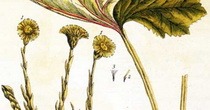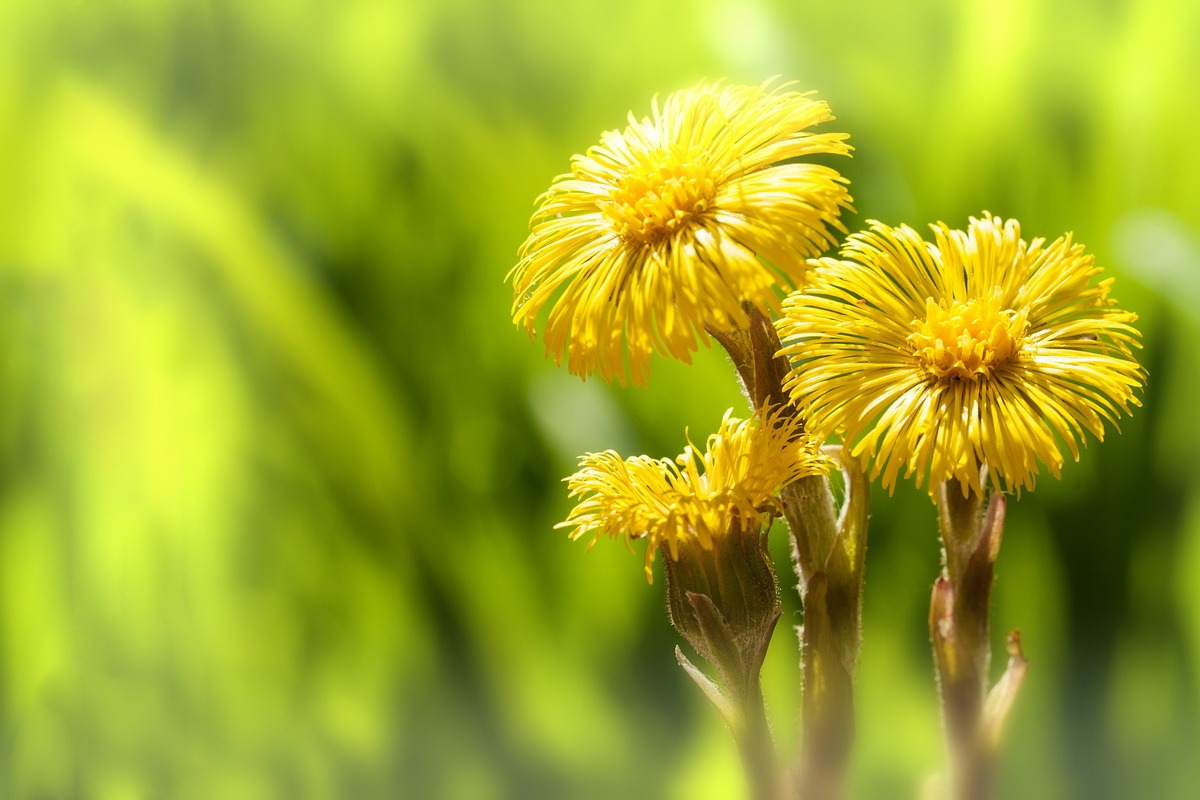The coltsfoot (Tussilago farfara) is the only plant species of the genus Tussilago from the daisy family (Asteraceae). It is one of the first spring flowers to appear before the foliage develops.
It is not uncommon for coltsfoot to be confused with butterbur, from which it differs not only in the flower structure but also in its biological effectiveness.
Biozevtika CO2 extract from coltsfoot is a fairly viscous, yellow-brown liquid with a distinctive odor. At temperatures above 300°C -350°C, the extract becomes slightly liquid and translucent.
Official pharmacology and traditional medicine recommend infusions and extracts of coltsfoot to treat various diseases of the lungs and upper respiratory tract, as well as diseases of the internal organs associated with inflammatory processes.
Since coltsfoot has a strong anti-inflammatory effect, it is used in the treatment of various abscesses, furunculosis, dermatitis, bruises, diaper rash, calluses, sweating of the feet. Coltsfoot helps with dandruff and is used in products to prevent bleeding gums.


Chart 1. Main components of Coltsfoot CO2 extract
| NAME | CONTENT IN% OF THE AMOUNT OF VOLATILE COMPONENTS | EFFECT |
|---|---|---|
| n-Gentriacontane | 3,4 | Has an astringent effect. It is used for internal bleeding and intestinal diseases. |
| Unknown sesquiterpene | 2,2 | Not available in databases. Effects unknown. |
| β-Caryophyllene Oxide | 2,0 | Used as a natural flavor. |
| Cadiene | 1,6 | Anti-inflammatory effect. |
| Neophytadia | 1,3 | Anti-inflammatory, hepatoprotective, antioxidant. |
| Phytol | 1,3 | Anti-inflammatory, including mastopathy. |
| α-Copaene | 1,2 | Antibacterial, antiseptic. In cosmetology – strengthens hair, increases skin turgor, improves blood circulation in the dermis. |
| Stigmastane-3,5-diene | 1,1 | Sterol, has high anti-cancer activity. |
| Spatulenol | 1,0 | Effective fungicide. In cosmetics, it can be recommended to fight certain types of dandruff. |
| α-Kadinol | 1,0 | Used as a raw material for the production of steroid hormones. |
Coltsfoot CO2 extract can be recommended for use in cosmetic and pharmaceutical products with the following spectrum of activity:
- Help fight acne
- Contribution to the fight against psoriasis and dermatitis
- Help in removing warts
- Anti-cellulite
- Increasing the firmness and elasticity of the skin
- Smoothes wrinkles
- Moisturizes and nourishes the skin
- Nourishes hair follicles
- Protection of hair from excision
- Stimulates hair growth
Chart 2. Application rates, recommendations for use and storage of CO2 extracts
| Food usage rates | The recommended range of use for the most popular 10% oil solutions of CO2 extracts among technologists in the cosmetic industry (item A10 according to our internal classification) is 0.05-0.5% of the mass of the finished product (0.5-5 g / kg or 0.5-5 kg/ton). For extracts from solutions of other concentrations (A1-A100), the application rates must be recalculated proportionately. |
| Recommendations for use | It is recommended to add CO2 extracts in the final stages of preparation, in the cooling phase of the end product. |
| Storage Instructions | It is recommended to store CO2 extracts in a closed container in a cool room and avoid direct sunlight. |
Historical reference

The entire history of the use of coltsfoot as a medicinal plant is associated with the treatment of coughs and colds, as well as healing the skin, including abscesses, boils and purulent wounds. The description of the healing properties can be found in the writings of Pliny and Dioscurides, and Hippocrates described not only the internal use of the plant as an expectorant, but also external – to treat abscesses and purulent wounds with the help of lotions.
